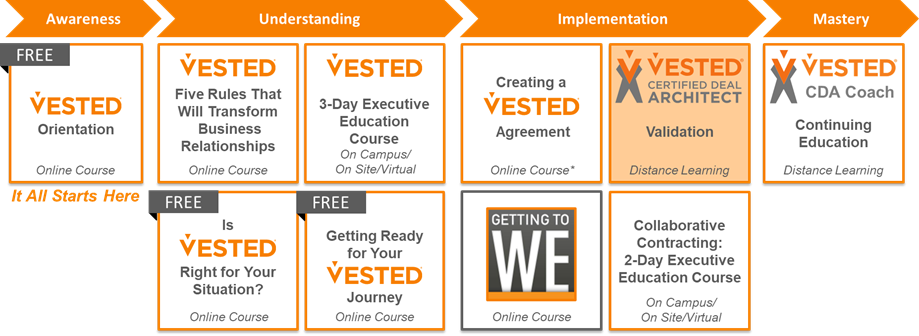A key part of the University of Tennessee’s Vested program is the UT Validation course.

The UT Validation course is designed to provide CDA candidates with feedback on how well they have applied Vested’s five rules/ten contractual elements in their contract. Individuals submit their agreement and artifacts for review to a UT faculty member (i.e., they submit their contract and each of the artifacts, such as workload allocation, pricing model, governance structure, etc). As part of the course, the UT faculty member provides a formal assessment with a “score” of how well the agreement followed the Vested five rules/ten contractual elements. A score of 4 out of 5 for each of the Vested elements is considered “passing.”
A benefit of the UT Validation course is a faculty member provides comprehensive feedback on each element where the submitted agreement falls short of a perfect score of 5. The review is conducted remotely via a virtual meeting (e.g., Zoom or Microsoft Teams), but can be done in person for an additional cost.
If the CDA candidate’s submitted contract and artifacts for their deal score at least a 4 out of 5 across all ten of the Vested elements, they will have achieved a “Certified Vested Deal.” In addition, each organization (e.g., the buyer and supplier organizations) will receive a plaque. They will also be able to use the logo at right for promotional purposes for their company in conjunction with the deal they have validated.
For more information about the UT Validation course, visit https://www.vestedway.com/ut-validation-course/.
If the CDA candidate’s deal does not score at least 4 out of 5 across all ten Vested elements, they can still receive their CDA certification, but their deal will not “pass” the validation and qualify as a Certified Deal. To pass the course and earn their CDA, the CDA candidate is required to explain the reason for any element that does not score at least a 4 out of 5, identify any potential risk associated with the gap, and outline how they would close the gap. Upon completion of the UT Validation course, the CDA candidate will individually be awarded a “Certified Deal Architect” status and will be able to use the following logo for promotional purposes for their own credentials. The logo can be used on business cards, as part of a signature line on emails, etc.
A CDA candidate may opt to resubmit their agreement in hopes to have it “pass” as a Certified Deal. CDA candidates may resubmit their agreement one time within the first three months at no additional cost for a second review. Because additional submissions require additional faculty time, they will be charged a fee.
When:
The UT Validation course can be taken any time—even after the CDA candidate has completed their Vested Agreement. Registering for the UT Validation course is a requirement for anyone wanting to become a Certified Deal Architect. A UT Validation is typically done after the individual pursuing their CDA has completed their Vested Agreement, but before the agreement is signed. Ideally, the validation is done prior to signing the agreement for the CDA candidate. Having the review completed prior to signing a contract also allows the CDA candidate to make any necessary adjustments before they sign.
It is important to note:
- CDA candidates must complete all Vested courses as part of the CDA program. The UT Validation course is just one of the courses.
- The UT Validation course is limited to a contract review and is not as comprehensive as a Center of Excellence (CoE) Deal Review. A Deal Review includes the contract review but also includes additional insights gained from the interviews and the Compatibility and Trust Assessment.
How Much:
The cost is $8,500, paid directly to the University of Tennessee upon registering for the course. This fee covers one CDA candidate and includes up to two submissions of the same agreement (provided the second occurs within three months of the first). The cost for additional reviews is generally $2,000 per submission or less.
- Often, organizations have more than one CDA candidate working on the same deal. For example, Vancouver Coastal Health had three team members, and Compass had two who were on the core team for their environmental services deal. The cost of the UT Validation course can be split between the buyer and supplier if the validation is done as a team. Only core team members who participated in the vast majority of all Vested workshops and meetings are eligible to use a group Validation for justification for a CDA. If there are multiple people getting validated on the same deal, they need to pay a $500 administration fee for each person.
- Most organizations working on larger and complex deals work with a Vested CoE for coaching support. In many cases, a formal post-contract review is included as part of their service offering. If your organization is working with a CoE, you may qualify to have the cost of the UT Validation course waived because the validation is part of the coaching support. However, CDA candidates will still need to cover a $500 administration fee for each person to get their CDA as part of a deal.
FAQs
What if I submit my agreement for the UT Validation course and it does not pass (receives a score of 4 out 5 across all ten Vested elements)?
If you are working toward your CDA, you will still receive your CDA certification, but your deal will not “pass” validation. As such, your organization will not be able to market or promote that they have a Vested Certified Deal.
It is possible to make the necessary improvements and resubmit an agreement for additional reviews. CDA candidates can resubmit their agreement a second time at no cost. The cost for additional reviews is $2,000 per submission.
I’d like to have a formal review of an existing contract to see if my agreement has any contractual gaps against Vested best practices. Can my company participate in the UT Validation course even if we do not have anyone working toward their CDA?
Yes, an organization can have a representative register for the UT Validation course even if they do not have anyone enrolled in the UT CDA program. If their deal “passes,” they will receive a plaque and will be able to use the Certified Deal logo for promotional purposes for their company in conjunction with the deal they have validated. Note: we do not certify companies, but individual agreements. If the agreement does not pass (i.e., scores at least 4 out of 5 across all ten Vested elements), your organization can resubmit the contract for additional reviews at the cost of $2,000 per resubmission.
Our contract is sensitive in nature. Can the reviewers sign an NDA?
Yes, the reviewer can sign an NDA.
How do you assign which faculty member does my UT Validation?
Kate Vitasek, the lead researcher and faculty for all of the Vested courses, assigns the faculty member who will do your review. Typically, a faculty member is selected that is either familiar with the type of deal you are submitting (e.g., logistics, facilities management, IT, BPO) or has geographical proximity to your organization. For example, one of our adjunct faculty members is David Frydlinger, a Partner with Lindahl Law Firm in Sweden.
If you are working with a Vested CoE, we assign a faculty member to review your deal that is not affiliated with the CoE you are using. We do this to avoid a conflict of interest. The only exception to this is if there is a language barrier for the faculty (e.g., the contract is written in Swedish, and the Lindahl Law Firm was your CoE).
My company is an outsourced service provider, and we have two Certified Deals. Can you certify our company as a Vested Certified Service Provider?
No. The reason is we have seen service providers that were exceptional in one case (e.g., had a Vested deal for one company) but were failing with a different client. A Vested Agreement requires both the buying organization and the service provider to understand to follow Vested’s five rules/ten elements. As such, we do not certify just one party, but the actual agreement resulting from the Vested partnership.
Can’t I just get a Vested CoE to do a contract review rather than submit my agreement to UT’s Validation Course?
Yes, but it will not count toward an individual’s CDA status. Nor will you be able to use the Certified Deal logo if the agreement passes as Certified. However, you will still benefit because a Vested CoE contract review will most likely show similar results to what a UT faculty member will find.
How long does it take to complete the UT Validation course?
It depends. A faculty member will typically take three weeks to review your agreement. However, this does not include the time for the CDA candidate to make adjustments (if needed) and resubmit for an additional review(s).

